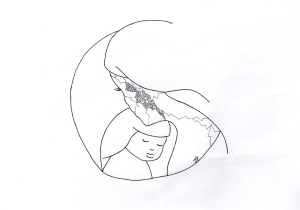
Johanna Friman
Doctor of Laws, Docent of International Law & TIAS Postdoctoral Fellow
We may be moving towards an Age of Artificiality. And I am not referring to the historical art period of the Late Baroque but to an era of post-humanity where we have delegated and transferred so much of our thinking, functions and autonomy over to machines that we have relinquished human mastery over our existence and our reality. In the Age of Artificiality, most aspects of reality and human life will be disrupted by varying degrees of artificiality. The borders between real and artificial, between fact and fake, are already blurred but we are still rushing forward. We are now travelling far beyond our human heartlands, in uncharted technological hinterlands – evidently largely without cognitive maps or spatial awareness. Starstruck and speed blind, the general idea now seems to be that we figure all this out as we go along and we will know where we are when we get there. And like it. The speed of the accelerating technological revolution is dizzying and the focus is very much on elements of speed, such as efficiency, as the stargate to utopia.
With the mindboggling advances made in the development of artificial intelligence, machines can already process information faster than humans. Their conclusions and results are ready before humans have had the time to even turn the ignition key on their thinking engines. Put a question to ChatGPT (or GPT-4/5 or a further improved replacement since ChatGPT and its successors may during the time it takes for this poor human to write this text have already exhausted their artificial existence) and it will produce an ostensibly coherent and convincing answer instantaneously. And for the human beneficiary, it is exceedingly challenging to penetrate the veil of nontransparency in the artificial thinking process in order to understand how the machine has arrived at its answer and assess its reliability. Easier perhaps for an ordinary human to consider declining the red pill and just taking the blue pill at this point.
AGI is lurking around the corner – and when it arrives the last remnants of human intelligence will be outsmarted and comically passé. There will be no need for humans to think at all anymore because AGI will think for us, and do a much more efficient job at it. No need to waste time needlessly overthinking things since human intelligence is hilariously substandard anyway compared to AGI. So, silencing the inner voice of humanity which obstinately persists with sounding the alarm bells, we will probably let our machines lead us further into the post-humanity Wilderness that is the Age of Artificiality. In the Age of Artificiality, our reality may be artificial but never mind, everything will certainly be more efficient. Who are you to question what you cannot understand anyway? If you have not already, this is perhaps when you should submit and take the blue pill.
This is fairly satirical and perhaps needlessly dystopian, but there is real (not artificial) concern at the heart of these rambling threads of human thought. This human is increasingly concerned that we seem to be moving very fast forward into alien and ever more treacherous territories without sufficient navigation or a clear sense of direction. Intuitively, I would like to pause now, please. Let us take a moment to think about this. Even AI experts, who are far more intelligent than I, seem to think that pausing now may be prudent – see, for instance:
https://www.bbc.com/news/technology-65760449
https://www.bbc.com/news/uk-65746524
https://www.bbc.com/news/world-us-canada-65452940
https://futureoflife.org/open-letter/pause-giant-ai-experiments/
https://www.safe.ai/statement-on-ai-risk
To start with, the intelligence of artificial intelligence may perhaps be contemplated in more depth. Is speed always an indicator of superior intelligence? When it comes to wisdom and enlightenment, which are elements of ‘real’ intelligence, the journey may be more significant than the final destination. Perhaps the temporality of intelligence is slightly misperceived? A slower thinking process allowing time for deeper reflection may perhaps be more ‘intelligent’ than a speedy thinking process quickly arriving at a result?
Be that as it may, the intrinsic artificiality of artificial intelligence seems pivotal – potentially much more significant for humanity than the projected intelligence of artificial intelligence – and raises many questions and certain quite sincere concerns. I would therefore like for us to take some time to think about the implications of artificiality, which in my view has not so far been discussed in adequate depth and from sufficient perspectives. In the AI debate, there has been much too much focus on intelligence, efficiency and result, and not nearly enough focus on artificiality. After all, artificial intelligence is artificial. We may perhaps approach the issue of artificiality through the following play of words:
A machine may look but cannot see.
A machine may hear but cannot listen.
A machine may sense but cannot feel.
A machine has no flesh to wound, no mind to lose, no soul to save.
It exists beyond the grace of mortal wonder.
Now, someone may argue that humans will not always see or listen either, so why should this be a problem with regard to machines? To me, there is a profound difference between ‘will not’ and ‘cannot’. It may be true that only humans can be inhuman but nonhuman may be worse still. Humans are born with an in-built intraverse that is very hard to artificially replicate. This human intraverse is the ultimate source of humanity, the essence of what human is, which lies beyond any mathematical calculation or rational reasoning. A machine has no such intraverse and exists beyond the grace of mortal wonder. Hence, artificial intelligence is always merely an artificial imitation and this inherent artificiality defines and limits its existence and adulterates all its functions and reasonings. Language, for instance, is more than counting words and calculating the order in which they appear; human language exists not only in the words but also between and behind the words, nuanced by feelings. The mind is not an ethereal, incorporeal entity of analytical rationality existing detached from the organic flesh – perceptions of flesh and mind fuse in the human intraverse, composing the living organism that is a human. Knowledge is not the same as ‘data’ and awareness is not the same as ‘information’; and without knowledge and awareness, precision and efficiency are meaningless. However precisely you dissect a human and however efficiently you inspect all its organic parts, you cannot find the human intraverse. ‘Real’ intelligence may thus be premised on life, where flesh and mind convene into ‘soul’ in the living human intraverse.
In this living human intraverse, reason is inherently integrated with feeling, cognition inherently interlaced with volition. Even if it is or will become possible to create a machine with autonomous cognition and volition, it will only ever be an artificial imitation of human cognition and volition. And this artificiality cannot be mitigated, however sophisticated the technology becomes. If it ever arrives, AGI can perhaps mimic human feelings with sophisticated technical sensors attached to refined synthetic flesh connected to a functional (superior) replica of a human brain – but this would still all be intrinsically artificial. Existing without a living intraverse beyond the grace of mortal wonder, a machine can never fully understand what human, or humanity, is. Regardless of sophistication and ‘intelligence’, a machine is always, in every way and in every function, artificial. Accordingly, whatever is produced, augmented, enhanced, reasoned, governed or administered by or through artificial intelligence will always be artificial. There is no escaping this artificiality. If we continue blindly forward into the Age of Artificiality, this artificiality will become ingrained everywhere, silently eroding humanity in all aspects of human life.
And more disquieting still, as humans increasingly interact with or through machines and defer more and more of our reality to artificial intelligence, will this artificiality eventually distort us, silently erode our own humanity? Human unwellness seems to be on a steep incline. We have all these emerging technologies with ever more sophisticated artificial intelligence offering a cornucopia of benefits, opportunities, entertainment and marvel. Yet, humans are feeling more and more unwell and the reason would not seem immediately obvious. Post-pandemic fatigue, climate change anxiety, information (and disinformation) overload, the impact of the cost of living crisis, FOMO, and the flux of international insecurity can perhaps explain some of the unwellness currently sweeping like a tsunami over the world – but this is far from the full picture. Human resilience seems to be crumbling, with particular concern about our most vulnerable. The young have always been the promise of humanity but our young are now also feeling increasingly unwell. Something nonvisible and insidious seems to be silently corroding humankind.

Image by Johanna Friman
In the hour of the wolf, I wonder whether the artificiality imperceptibly disrupting our lives through our technologies and digitalisations may be a partial cause for this rising indeterminate human unwellness. As artificiality increasingly seeps into our daily lives from many different technologies and digital platforms, we may on some unconscious level sense that something is slightly ‘off’; yet the reason for this unease may be difficult to rationally determine, translating into a diffuse feeling of general unwellness without a concrete, logical cause to explain it. If we continue blindly forward into the Age of Artificiality, will we with time become ever slightly less human and more and more ‘artificial’ by slowly and silently eroding the living intraverse that is the source of our humanity?
This is of profound importance, I think, and calls for earnest reflection. And earnest reflection requires time because it is the questions and the thinking process they inspire that brings wisdom and enlightenment. Artificial intelligence may have many benefits for humanity. There are undoubtedly many innovations, scientific discoveries, new modes of learning and communication and other marvels that humanity can achieve with the aid of emerging technologies. However, when designing our future collaboration architectures with machines and before we delegate all our thinking and transfer all our autonomy to artificial intelligences, it may be wise to earnestly consider who is master here, and who is servant. We should therefore perhaps pause now and devote sufficient time to reflect on the implications of artificiality – and not rush blindly forward into a post-humanity Age of Artificiality.
